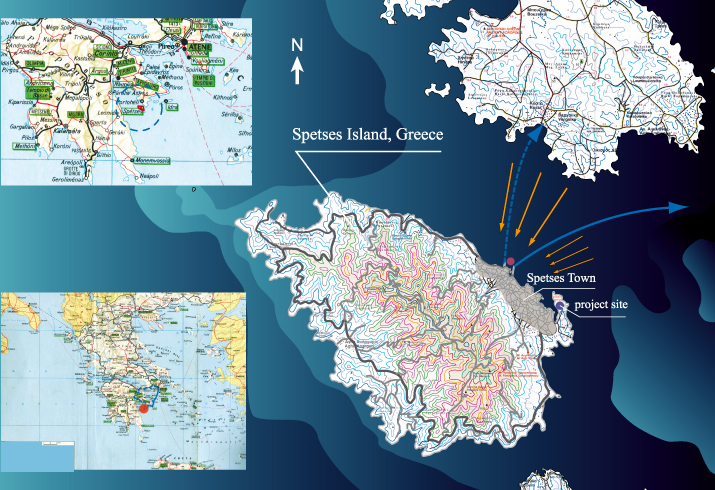application case: spetses island, GReece
Spetses has a strategic location. It is located between the Saronic Gulf and the Argolic Gulf, a position from wich the name "Argosaronic Island" derives. In fact the island is in a direct line from Piraus (Athene) and the Attic coast and in the same time its position is in front of the northeastern coast of the Peloponnese. The distance from it, is just 1,5 nauticalmiles, and often in Summer, visitors take a "water taxi" for a swim at Spetse's beaches or to enjoy seafood at one of the island's tavernas. While this island was not particularly wellknown in antiquity, it played important role (together Poros and Hydra) in the Greek War of Independence and in the creation of the modern Greek State. In fact, Hydra and Spetses supplied the naval muscle of the Greeks during their war of indipendence from the Ottoman Turks. The island cover an area of about 22 square Kilometers, with a coast line of about 25 Kilometers. History Sparse archaelogical finds on the island indicate it has been inhabited since the Early Bronze Age (about 2500 B.C.), perhaps, ships from Luena, a Mycenean settlement south of Argos, have anchored at Ayia Marina to route to Crete or other trading ports. In antiquity Spetses was known as "Pityoussa", which means "pine-covered". At the present its actual name is believed the result of succesive corruption of that ancient greek word by invaders, particularly the Venetians who referred to it as "Spetsia". This word seems refer to italian "spezia", which means "spice". Until the 15th century, the island's population was mostly transient and its numbers fluctuated according to conditions on the Peloponnese. According to several accounts, refuges from the mainland opposite often sought shelter along Spetses's densely forested coast as they fled invaders. Settlers were also discouraged by the frequent pirate raids, and did not begin to set up organized settlements until the 17th century. (In fact the first known map of the island was drawn by the French traveler Andrè Thevet in the mid-16th century). As the island was settled, Spetses began to develop the marine tradition that has become its "hall-mark". Shipbuilding was developed and flourished in Baltiza, more commonly known today as the Old Harbor. While a Greek revolt against the Ottoman Turks took root, the Spetsiotes built an impressive merchant fleet that they quickly converted to warship when the war for Greeke independence broke out. Spetsiote ships played a crucial role in the liberation of the Peloponnese by helping mount naval blockades of Nafplio, Monemvassia, and Mani. These ships were also used to transport weapons and supplies to other island joining in the revolution. The most courages Spetsiote captain was undoubtedly "Lascarina Bouboulina", who spent most of her fortune to help finance the war. One of the most decisive battles was the defeat of the Ottoman fleet in the Argolic Gulf. In the early 1900s, Spetses emerged as a popular resort for the upper middle classes, who where attracted by the affluence and education of its more prominent families. This image seems the result of the work of a repatriating Spetsiote: Sotiris Anaryros. The scion of a local shipping family, Anaryros migrated to America, where he made a fortune in tobacco. He used this money to build a reservoir and a road-to this day, the onlyone on the island. He also financed a reforestation and conservation program that helped preserve the island's thick pine forest. In 1914, having retired to Spetses Anaryros financed the construction of the luxurious "Posidonio Hotel". The largest resort in the Balkans at the time, in its heyday the Posidonio drew wealthy merchants and minor European nobility. Britain's decision to establish a mooring for its fleet at the island in 1928 added to its a cosmopolitan air. Anaryiros also founded a prestigious private school, which finally closed in 1983. (Now somebody is thinking to open it again as a "tourist-school"). The English novelist John Fowles taught at the Anaryirios College, an experience that provided him the material for one novel.


